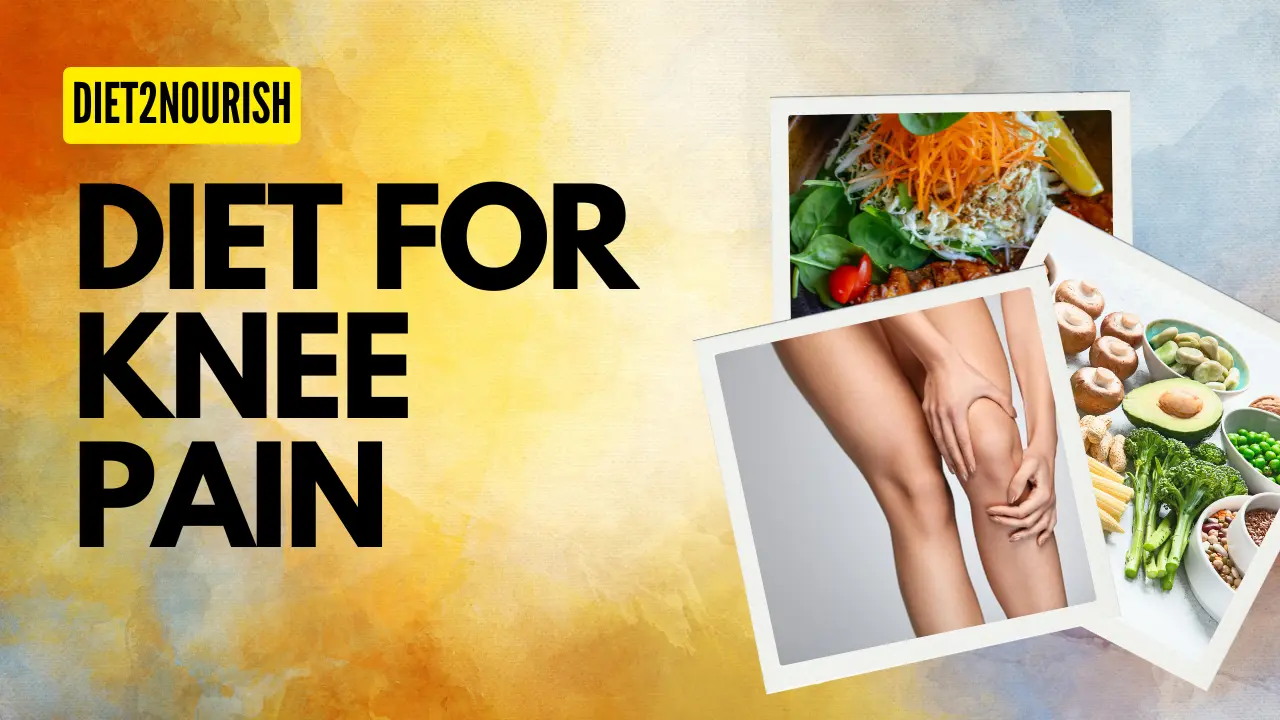The knee is the largest joint of our body and is also the one that gets easily injured. Apart from injuries to the knee, the pain in the knees is most common amongst people of all ages. As the knees are exposed to a lot of stress, we must take care of the joint from our early days. Diet plays an important role in our body’s functionality, fighting diseases, and shielding us from aches and pains, including knee pains. If you are suffering from knee joint pain, and plan to tackle the problem, you cannot overlook the power of food. Diet for knee pain will not only help develop healthy cartilage, and cut down inflammation, but you will also keep your weight under control.
Diet for Knee Pain
It is often seen that obesity in people causes advanced degenerative damage to the knees, thus their knee pain, limiting regular activities. The best diet for knee pain is the one that does not let you gain weight and stops inflammation.
In a diet for knee pain, you will have to follow a few simple steps to ensure that your knee and other joints are healthy and happy. First and foremost, you will need to:
- Cut down on foods that contain excess sugar
- Avoid the consumption of processed carbohydrate foods – white rice, white flour, white bread, and sugar.
- Say no to fried foods.
- A strict ‘no’ for red and processed meats.
- Cut your calorie intake.
- Eat mostly plant-based foods, and
- Avoid cooking your food at high temperatures.
Food for knee pain
Foods that help control inflammation, improve build density, help manage your weight, strengthen the connective tissues, and promote overall good health are the food for knee pain that you should include in your daily diet.
Below is a list of the best food for knee pain:
Fatty fishes
Fatty fishes like salmon, trout, sardines, and tuna are an excellent source of omega-3 fatty acids. Not only this nutrient helps reduce inflammation, but it also improves our brain functionality and lowers the risks of diabetes, heart diseases, and many other ailments.
Beans and lentils
Both beans and lentils are excellent sources of fiber, protein, and essential minerals. They also possess antioxidant and anti-inflammatory properties and are a great source of anthocyanins – the magical element that helps reduce inflammation.
Garlic and other root vegetables
Root vegetables such as garlic, onions, turmeric, and ginger are all known for their anti-inflammatory properties. These vegetables have been found effective in treating arthritis symptoms and joint pains.
Whole grains
The protein found in refined grains like white flour, pasta, white rice, and alike can trigger inflammation in the joints. But, high-fiber whole grains like whole oats, whole wheat, rye, and barley aid in producing fatty acids that counteract inflammation.
Cruciferous vegetables
Broccoli, cauliflower, Brussel sprouts, kale, spinach, mustard greens, and arugula are all vegetables that are known to block the enzyme that may cause swelling and pains in the joints. Plus, these vegetables are powerhouses of fiber, vitamins, and other nutrients.
Fruits
Fruits are naturally rich in antioxidants, and certain fruits, particularly blueberries, have higher amounts of anthocyanin, a flavonoid that turns off inflammatory responses in the body. Apples on the other hand are rich in fiber and anti-inflammatory properties, and pineapples have bromelain that reduces joint pains.
Nuts and seeds
Nuts and seeds are rich in omega-3. Almonds, walnuts, chia seeds, and flax seeds can help in reducing inflammation of the knee joints and the connective tissues.
Olive oil
Where oils like peanut oil, sunflower oil, and vegetable oils can increase inflammation, olive oil has unsaturated healthy fats and above all – omega 3. Go for extra virgin olive oil for more benefits.
Dark chocolate
Dark chocolate has anti-inflammatory properties and contains antioxidants that fight inflammation.
Food for knee strengthening
Our knees play a crucial role in our day-to-day activities. It is why keeping our knees healthy is of prime importance for us, and we can do so by exercising regularly and eating the right food for knee strengthening.
Foods high in vitamin C:
Vitamin C is important for collagen formation – a vital component of the knee cartilage. Tomatoes, broccoli, red and green peppers, and citrus fruits are high in vitamin C.
Foods high in copper and zinc:
Copper and zinc are much required by the body for collagen formation. Some better sources of copper and zinc foods are whole grains, nuts, beans, meats, and shellfishes.
Protein-rich foods:
The human body cannot produce collagen without proteins. Make sure you add foods like beans, dairy, eggs, chicken, and fish to your diet.
Anti-inflammatory foods:
To improve the strength of the knees, the muscles, ligaments, and tendons surrounding the joint should also be strong. This helps reduce pain and inflammation. Include foods like olive oil, tomatoes, fatty fish, berries, and oranges in your diet.
Omega-3 fatty acids:
Eating foods rich in omega-3 fatty acids helps reduce pain and inflammation. Fatty fishes like salmon, trout, sardines, tuna, nuts, and seeds have high omega-3 contents.
Knee pain home remedies food
Mild to moderate knee pain can easily be treated at home. Here are some knee pain home remedies foods that can improve your comfort and help you get relief from mild knee pains from the comfort of your home.
1. Ginger extract:
Ginger has anti-inflammatory properties that have been found to reduce pains and aches. You can try ginger in many forms – as supplements, drink ginger tea, or ground ginger to flavor dishes.
2. Apple cider vinegar:
The anti-inflammatory property of apple cider vinegar can help you get relief from knee joint pains. It is one of the best-in-class knee lubrication foods that works by maintaining joint lubrication to move your legs easily.
3. Turmeric:
Turmeric contains curcumin – an anti-inflammatory compound that helps alleviate symptoms of joint pains.
4. Cayenne pepper:
This red spice has an active compound called capsaicin which acts as a natural painkiller for joint pains.
5. Epsom salt:
Magnesium and sulfate in Epsom salt are both great pain-relieving agents. It helps reduce swelling in joints and fights pain.
Calcium food for knee pain
Eating the right kinds of food can go a long way in supporting bone health. Calcium along with vitamin D are the two nutrients that are very important for our bone health. Calcium provides our bones and the joints the strength it needs to support everyday activities and vitamin D helps the body absorb the calcium we get through the foods we eat. Long-term calcium deficiency may lead to bone loss and bone diseases like osteoporosis. Here are some calcium foods for knee pain that we should all eat:
- Soy and soy products
- Legumes
- Nuts, especially almonds.
- Fruits and vegetables like figs, oranges, broccoli, cabbage, green beans, and leafy greens.
- Whole grains, mainly oats.
- Flax seeds
Food to avoid knee pain
Our diet has a great impact on the well-being and health of our knees. While eating certain foods can heal knee pains, there is food to avoid knee pain too, and they are:
1. Salt:
Salt attracts water which can escalate knee joint pains and inflammation.
2. Sugar:
High sugar consumption stimulates immune cells and releases molecules that irritate the joints and tissues.
3. Red meat:
red meats have higher levels of inflammatory markers worsening joint pains.
4. Omega-6 fatty acids:
Omega-6 is important, but at the same time it boosts the number of inflammatory chemicals that our body produces. Omega-6 can be found in peanut oil, vegetable oils, safflower oil, sunflower oil, and corn oil.
5. Alcohol:
Alcohol can increase the severity of knee pains, and is otherwise bad for our overall health.
Cherries, red peppers, canned salmon, plain yogurt, sardines, and trout are some foods that are regarded as knee lubrication foods that we should include in our diets to keep our knee joints lubricated.
Do’s and Don’ts
Our knee is responsible for almost everything that we do – walk, sit, run, lift, jump, and much more. But at the same time, the knee joint is also the most vulnerable part of the body that may get injured easily. Here are some Do’s and Don’ts recommended for knee joint pain:
- In the smallest of incidences, if you feel pain in your knee joint, give some time (1-2 days) to your knee to rest. Do not keep stressing the joint.
- Apply the RICE technique, (R – Rest, I – Ice the knee area, C – Compress, and E – Elevate the knee area using a pillow or stool).
- Keep your weight under watch.
- Use both heat and cold.
- Provide support to the arches. Use shoes that support arches.
- Consult your doctor if the pain persists.
- Do not stay idle for long. Give your knee joint some exercise. Once the pain is gone after rest, get there. It will help build strong muscles around the knee and prevent further injuries.
- Avoid falls, slips, and falls.
- Don’t sleep in the wrong position.
- Do not overload your knee joints. Putting extra pressure on the joints can cause pains.
- Change your shoes before it completely wears out.
Frequently Asked Questions (FAQs)
Fruits that are richly colored like Blueberries, blackberries, strawberries, raspberries, cherries, grapefruits, oranges, and tomatoes are all rich in the two nutrients – anthocyanins and lycopene, which fight against inflammation. Citrus fruits are also considered good for the knee joint as they contain vitamin C, which fights inflammation.
These are the best fruits for the knee joint because they:
controls inflammation
strengthens the connecting tissues
increases bone density
promotes weight management, and
is good for our overall health
Milk protects the health of our knees and the joints. Drinking milk regularly can help us build stronger bones. Drinking milk regularly has several health benefits as milk is nutritionally rich in potassium, calcium, protein, zinc, thiamine, vitamin D, vitamin B12, and vitamin A.
Milk is known to lower blood pressure, and reduce the risks of developing type 2 diabetes and cardiovascular diseases. As far as knee pain is concerned, milk helps improve our bone health, and reduces the chance of developing osteoporosis.

